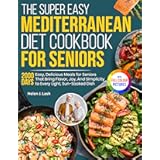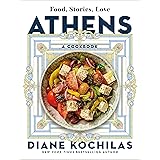Have you ever wondered if there’s a way to eat delicious food, feel satisfied, and still live a longer, healthier life? The video above offers a fantastic introduction to the Mediterranean diet, a way of eating that has captured the attention of health experts worldwide. For the fifth consecutive year, the US News & World Report crowned the Mediterranean diet as the best overall diet, a testament to its enduring benefits and sustainable approach. This isn’t just another fad; it’s a lifestyle rooted in the traditional eating patterns of countries bordering the Mediterranean Sea, offering a roadmap to improved well-being without strict limitations.
Unlocking the Benefits of the Mediterranean Lifestyle
The allure of the Mediterranean diet extends far beyond just what’s on your plate. It’s an approach to nourishment that prioritizes enjoyment, community, and fresh, wholesome ingredients. This inclusivity is a primary reason why so many people find it sustainable and enjoyable. Unlike restrictive diets that leave you feeling hungry and deprived, the Mediterranean eating pattern encourages eating until you are comfortably full, focusing on nutrient-dense foods that naturally satisfy.
The numerous health advantages associated with adopting this dietary pattern are compelling and scientifically supported. Imagine a diet that not only helps you manage your weight but also shields you from serious health concerns. The foundation of plant-based foods in the Mediterranean diet plays a crucial role in these positive outcomes. From vibrant vegetables to hearty whole grains, these foods are packed with fiber, vitamins, and antioxidants that work synergistically to promote health.
Protecting Your Heart and Body
One of the most celebrated benefits of the Mediterranean diet is its profound impact on cardiovascular health. It’s a powerful ally in reducing the risk of heart disease and related mortality. By emphasizing healthy fats, lean proteins, and an abundance of plant-based foods, this diet helps maintain healthy cholesterol levels, regulate blood pressure, and reduce inflammation, all vital for a strong heart. Think of it as giving your cardiovascular system a gentle, daily massage with wholesome nutrients.
Furthermore, the Mediterranean diet is a powerful tool in improving body composition and combating obesity. It’s not just about shedding pounds; it’s about fostering a healthier physique and protecting yourself from various diseases. As we navigate life, especially past the age of 40, our bodies often undergo changes that can lead to typical weight gain. This diet helps to offset those tendencies, maintaining a more stable and healthy weight through mindful eating and nutritious choices. It’s like having a natural guardian against the creeping weight gain that can often accompany aging.
Managing Blood Sugar and Enhancing Longevity
For individuals concerned with blood sugar control or living with type 2 diabetes, the Mediterranean diet offers significant relief. Its emphasis on whole grains, legumes, and fiber-rich fruits and vegetables helps to stabilize blood sugar levels, preventing the dramatic spikes and crashes that can be detrimental. This steady release of glucose into the bloodstream can alleviate symptoms and improve overall diabetic management, making it a powerful therapeutic approach.
Beyond these specific benefits, studies consistently show that embracing the Mediterranean diet can contribute to a longer, healthier life. It’s a holistic approach that nurtures the body from the inside out, promoting vitality and resilience against chronic conditions. By fueling your body with high-quality ingredients and adopting mindful eating habits, you’re not just changing your diet; you’re investing in your future well-being and longevity.
Key Principles of the Mediterranean Diet
The beauty of the Mediterranean diet lies in its principles rather than rigid rules. It’s about making conscious, healthy choices consistently, transforming your eating habits into a sustainable and enjoyable lifestyle. As the video highlighted, there aren’t many restrictions, but rather a set of guidelines that empower you to eat until satisfied while nourishing your body. Let’s delve deeper into these foundational elements.
Embracing Plant-Based Eating
At the very heart of the Mediterranean diet is a profound appreciation for plant-based foods. Imagine your plate as a vibrant garden, bursting with color and freshness. Each meal you consume should feature a generous array of these wholesome ingredients, forming the bulk of your intake. This includes:
- Vegetables: A diverse spectrum, from leafy greens like spinach and kale to cruciferous options like broccoli and cauliflower, and root vegetables such as carrots and potatoes.
- Fruits: Enjoy a wide variety, including berries, citrus fruits, apples, grapes, and figs, providing natural sweetness and essential nutrients.
- Legumes and Pulses: Lentils, chickpeas, black beans, and kidney beans are staples, offering significant protein and fiber.
- Nuts and Seeds: Almonds, walnuts, cashews, sunflower seeds, and chia seeds provide healthy fats, protein, and crunch.
- Whole Grains: Opt for whole wheat bread, pasta, brown rice, quinoa, farro, and oats, which offer sustained energy and fiber.
These plant foods are not just fillers; they are nutrient powerhouses, providing antioxidants, fiber, and essential vitamins and minerals that protect cells, aid digestion, and boost overall health. Their presence helps you feel full and satisfied, reducing the desire for less nutritious options.
Harnessing Healthy Fats with Olive Oil
The Mediterranean diet is synonymous with high-quality extra virgin olive oil (EVOO), and for good reason. EVOO is more than just a cooking fat; it’s a cornerstone of this eating pattern, used generously in cooking, dressings, and even as a dip for bread. It’s a monounsaturated fat, celebrated for its anti-inflammatory properties and its role in improving heart health. Think of it as liquid gold, imparting flavor and health benefits to countless dishes.
While EVOO holds a prominent place, other non-inflammatory plant-based fats are also encouraged. Avocados, with their creamy texture and rich monounsaturated fatty acids, are an excellent addition. Nuts and seeds, mentioned earlier, also contribute healthy fats. Shifting your fat sources from saturated and trans fats to these plant-based options is a critical principle for supporting overall well-being.
Smart Seafood Choices
Seafood plays a vital role in the Mediterranean diet, serving as a primary source of lean protein and beneficial omega-3 fatty acids. The recommendation is to incorporate seafood into your meals at least twice a week. These lean protein sources are crucial for muscle maintenance and overall bodily functions. Focus on fatty fish options that are rich in omega-3s, which are essential for brain health, reducing inflammation, and supporting cardiovascular function. Great choices include:
- Salmon
- Tuna
- Sardines
- Mackerel
- Mussels
- Shrimp
- Scallops
These diverse options ensure variety in your meals while providing the nutritional punch you need. Integrating these into your weekly routine is a delicious way to boost your intake of vital nutrients often lacking in other diets.
Balancing Dairy and Lean Proteins
Dairy products, such as yogurt and cheese, are enjoyed in Mediterranean cultures, but often in moderation compared to typical Western diets. The key here is portion control. You don’t have to eliminate them entirely, but you might find yourself eating less than you currently do. Opt for plain, unsweetened yogurt and flavorful cheeses used as accents rather than main components of a meal. These can provide calcium and probiotics, beneficial for bone and gut health, respectively.
Regarding other animal-based foods, the Mediterranean diet advocates for eating them less frequently. Chicken and eggs are acceptable, often enjoyed a few times a week. However, red meat intake should be significantly reduced. When you do choose to eat red meat, it’s best to treat it as an occasional indulgence, ensuring it is surrounded by an abundance of plants to balance the meal. This approach recognizes the nutritional value of these foods but emphasizes a plant-centric foundation.
Minimizing Processed Foods and Sugars
A core principle for promoting longevity and preventing chronic disease is to drastically reduce your intake of sugar and refined grains. These ubiquitous ingredients are known culprits for causing inflammation and oxidative stress within the body. Picture inflammation as a smoldering fire and oxidative stress as rust forming inside your body; both contribute to chronic health problems over time. Furthermore, both sugar and refined grains can lead to more significant weight gain than usual, undermining your health goals.
By opting for naturally sweet fruits, whole grains, and homemade meals, you naturally cut down on these detrimental components. This shift helps your body function optimally, reducing the burden of processing empty calories and harmful additives. It’s about choosing foods that fuel your body and protect its systems, rather than taxing them.
The Role of Quality Ingredients and Mindful Eating
The Mediterranean way of eating places a high value on the quality and freshness of ingredients. Imagine the difference in taste and nutritional value between a vine-ripened tomato picked from a garden and one that traveled thousands of miles. Mediterranean food is truly about eating fresh and healthy, celebrating the natural flavors of high-quality produce, oils, and proteins. Poor-quality ingredients not only compromise taste but also provide fewer health benefits.
Finally, while the video mentions alcohol in moderation, particularly wine, it’s important to frame this within a broader context of mindful eating and social connection. For women, this typically means no more than one 5-ounce glass per day, and for men, no more than two 5-ounce glasses. This isn’t a license to drink daily, but rather an acknowledgment of wine’s cultural role in Mediterranean meals, enjoyed slowly and with company. The overall emphasis remains on savoring your food, eating with others, and incorporating physical activity into your daily routine. This holistic approach is what makes the Mediterranean diet a true lifestyle, offering a path to lasting health and enjoyment.











